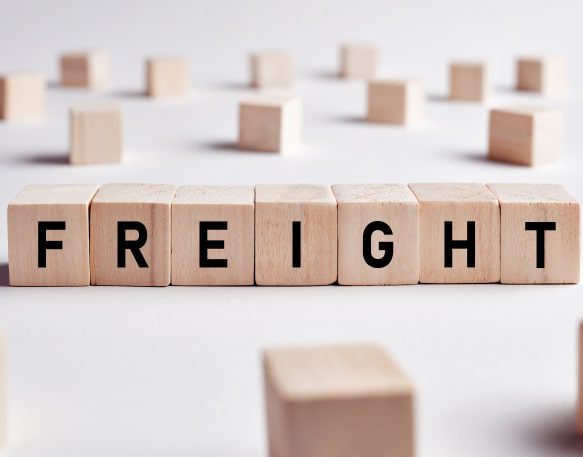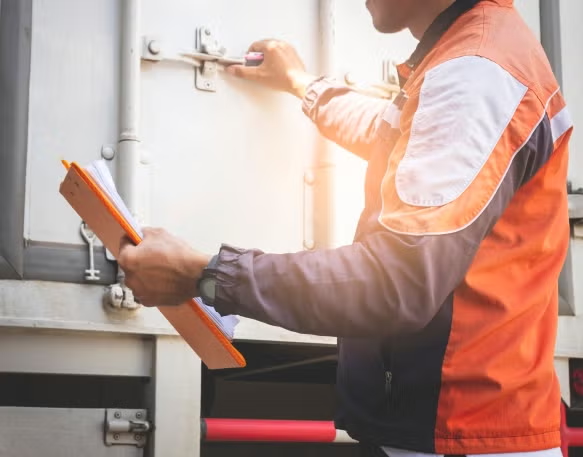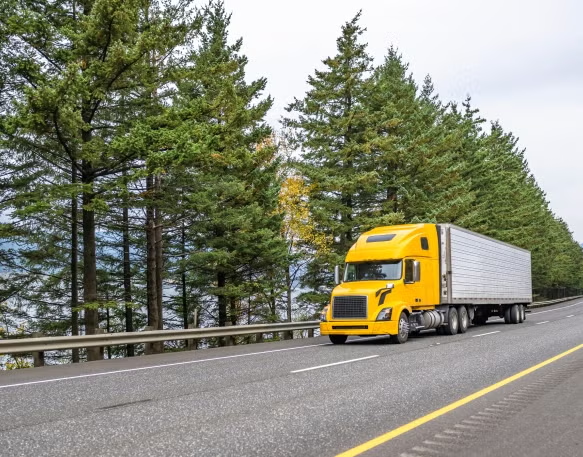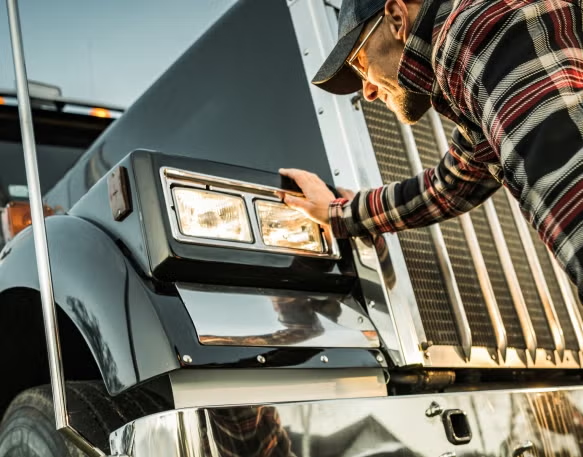To help you get started, here are a few of the most commonly used trucking terms, along with some of the trucking lingo you might encounter as you get started with DAT–where you’ll always find the right loads for the best price to grow your business.
In this guide, we’ll walk you through some of the top trucking terms to get you started using common trucking lingo like a pro.
Types of trucks and trailers
Commercial trucking is one of the cornerstones of the American economy. But for those who are just starting out, there’s quite a bit of trucker lingo to get used to — including when it comes to the many different types of trucks you can choose from. Here are a few of the trucking terms you’re most likely to encounter when talking trucking jobs.
Box truck – In trucking lingo, a box truck is also sometimes referred to as a box van, cube van, bob truck or cube truck. A box truck has a chassis cab, and cargo is transported in an enclosed, cube-shaped area. Most box trucks separate the cabin from the cargo areas, though some do include doors between the truck cabin and cargo area so you can pass through when stopped.
Flatbed truck – Unlike a box truck, which encloses the cargo area, a flatbed truck’s trailer does not have sides or a roof over the cargo compartment, meaning the freight is more exposed to the elements. Cargo can be loaded directly onto these types of trucks (instead of into them).
Reefer – A reefer truck has a refrigerated trailer. While it can be used to transport any freight, it’s typically used to transport freight that requires a temperature-controlled environment like food and medication.
Semi truck – A semi truck is a compartment used for transporting freight connected to a power unit or to another trailer. They are also sometimes called semi-trailers, eighteen-wheelers, big rigs, or simply “semis.”
Tanker truck – Tanker trucks are also known as fuel trucks or gas trucks and are used to transport liquids and gasses.
Tractor – This term encompasses any truck that is used to pull a trailer.
Trailer – A trailer is the non-motorized unit that is pulled by the truck or tractor. Reefers, vans, and flatbeds are all types of trailers.
Truck – In trucker terminology, a truck is usually an 18-wheeler with detachable trailer. However, when it comes to more casual trucking lingo, the term “truck” is often used far more broadly when referring to vehicles.
Van – Also called a “dry van,” these are the most common type of trailer. The term van can be used to describe any enclosed rectangular box that holds freight. The most common types of vans are 53 feet long.
People in the trucking industry
Just as trucker terms have evolved to cover a lot of different types of trucks and trailers, there is also specific trucker terminology used to describe the many people that help make hauls happen.
Broker – The broker acts as an impartial go-between for shippers and carriers, arranging the transaction between the two. In most cases, carriers and shippers are required to work through brokers to arrange their contracts. They are also sometimes referred to as a freight broker or property broker in trucking terminology.
Carrier – Whether it’s a large trucking fleet or an independent owner-operator, a motor carrier is a business entity that transports goods.
Owner-operator – An individual who owns the truck and uses it to transport cargo on a regular basis. Sometimes, owner-operators work with larger trucking companies and work under the authority of the larger carrier.
Shipper – This term refers to the sender of cargo. Shippers can be manufacturers, growers, retailers, distributors, or any other business or individual hiring the help of a carrier to transport goods.
Industry terms
In trucker lingo, there are a lot of different terms used to describe the core elements of the industry and of day-to-day business. Here are a few of the most common.
Authorized carrier – To operate legally, a carrier needs to get operating authority. An authorized carrier is a carrier who has gone through that process and received their legal authorization to transport freight.
Contract rate – This is the stated rate per mile that a carrier will be paid for the duration of their work. It is agreed upon by the carrier and shipper during their negotiations.
Deadhead – In trucker lingo, to “deadhead” means to drive with an empty trailer. Because carriers are usually paid by the mile only when trucks have freight, deadheading often means the truck is moving without making profit. It typically occurs on the way back from delivering a load or on the way to a new load. Deadheading is costly and should be avoided whenever possible by picking up backhauls.
Drop and hook – This is a specific form of trucking and type of freight where, instead of waiting for loading and unloading, “drop and hook” allows the carrier to leave a loaded trailer at a dock, then hook the truck up to a different trailer for the return journey.
Hot shot – A “hot shot” load is generally a smaller load, 36,000 pounds or less, and it is typically expedited. Hot shots are used in industries that need materials moved from one place to another quickly, such as construction. In addition to describing the freight itself, hot shot can also refer to the vehicle that picks up these loads.
Lane – This term encompasses the origin and destination of a particular route. Miami to Houston would be its own distinct lane, as would Houston to Miami.
Less-than-truckload (LTL) – A “LTL” shipment refers to freight that does not fill the trailer on its own. Truckers can often combine multiple “less-than-truckload” shipments into a single journey.
Load – The freight being shipped.
Expedited freight – Expedited freight is a freight that is time sensitive and often must be delivered within an agreed-upon window.
Truckload – A truckload is freight that fills the truck’s entire trailer, whether by reaching maximum weight, volume, or both.
Certifications and agencies
Knowing what kind of truck and freight you want to work with isn’t enough to get started in trucking. You also need to make sure you have the legal authority to move freight, which means working with a number of different agencies and receiving legal certifications. Here’s the trucking terminology you need to know to get started legally:
Authority – In trucking terms, authority refers to the right to operate legally. For-hire carriers and freight brokers must each qualify for operating authority from the U.S. Department of Transportation.
CDL – Commercial Driver’s License. The U.S. Department of Transportation requires a CDL for anyone who drives a truck or bus that weighs more than 26,000 pounds gross vehicle weight. Obtaining a CDL means acquiring more knowledge than what is required for a regular driver’s license and also necessitates a yearly physical examination. CDLs must also be renewed regularly. The length of time before expiration varies by state, but is normally somewhere between five and eight years.
DOT – Department of Transportation. The DOT is a federal agency that regulates interstate trucking across the United States.
FMCSA – Federal Motor Carrier Safety Administration. Within the U.S. Department of Transportation, this agency makes sure carriers are adhering to commercial motor vehicle safety regulations. Companies that operate commercial vehicles must register with the FMCSA and be issued a USDOT and/or MC Number for identification purposes.
DAT terms
Once you know the key trucking lingo, it’s time to start getting the tools that will help you start your business. As the largest freight marketplace in the industry, DAT offers a variety of solutions designed to make life easier for truckers. Key trucking terminology when it comes to DAT includes:
Authority – We mentioned this before, but if you want to get started in trucking, you first need to get the operating authority that will let you do so. That means navigating a lot of paperwork, getting official numbers from the organizations discussed above, and more. That may sound like a lot of work, but the experts at DAT Authority are here to help you every step of the way, ensuring that you get your operating authority as quickly and painlessly as possible so you can get on the road fast.
Load board – Load boards are virtual marketplaces where carriers, brokers, and shippers can connect to get freight delivered from point A to point B. For carriers, it’s a place to search for freight that matches your vehicle, research brokers, and build connections that can help you grow your business in the long run. The DAT load board is the largest in the industry, making it the perfect place to find quality freight no matter how long you’ve been in the business.
DAT One Mobile App – The best mobile app in the industry, the DAT One mobile app combines 15 apps in one, bringing all the tools you may need while on the road right to your fingertips including fuel station maps, load boards, rest stop information, and so much more.
TriHaul™ – Making the most of equipment and time is key to efficiency. Three-legged routes, instead of straight round trips between point A and point B usually mean better pay without wasting time. DAT’s TriHaul feature automatically helps carriers quickly find three-legged, TriHaul routes.
Set yourself up for success in the trucking industry with DAT
Learning trucking lingo is an important part of setting yourself up for success as a trucker, but it isn’t enough on its own! Luckily DAT has all the tools you need to get started and grow your business no matter what area of the trucking industry you want to work in. With experts that can help you obtain operating authority, the largest load board in the industry, analytics tools that can help you understand the market to make better business decisions, and so much more, DAT has everything you need to succeed in the trucking industry! Reach out today to learn more!
Find the best freight with DAT!
No matter what kind of freight you’re looking for, the DAT load board is the best place to find the loads and make the connections that will keep your business moving forward. With more than 644,500 new posts every business day, there’s always something new to discover on the DAT load board. Sign up today!




